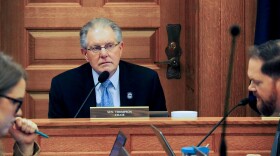Churches in Johnson County — particularly Catholic parishes — have been involved in a campaign to change the Kansas Constitution removing a right to abortion.
In the weeks leading up to the August 2 primary vote, banners and signs have sprung up on some church properties in support of the Value Them Both amendment (and in fewer cases, against the amendment).
That has prompted some county residents to question the legality of having the signs up if those same churches are also polling sites on August 2.
The county election office has fielded numerous calls about signs on church property, with many callers expressing concern that they could influence voters at church sites, said Election Commissioner Fred Sherman.
Of the 146 precinct polling places that will be open on Election Day this coming Tuesday, 92 will be at church facilities, Sherman said.]
But no matter where the ballot boxes are, Kansas law says “electioneering” can’t be done within 250 feet of the door or within the building during election hours.
Electioneering includes signs, pamphlets or other material that attempts to influence the voters lining up to cast their ballots. Bumper stickers on vehicles that have been driven to the site are the exception.
Sherman said the election office communicates that rule to every polling place and trains workers to know it as well. People in charge of those properties also agree not to post political signs on their properties during the voting, he said, and 99% of the time they are compliant, even if their property extends beyond the 250-foot requirement.
That can get tricky, though, when the 250-foot boundary extends into neighboring private property. Since electioneering is still illegal, Sherman said poll workers are trained to lay the signs down, but not remove them in that case.
The 92 church polling places include a variety of denominations. Several Catholic parishes are among them.
A spot check of a few randomly selected church polling sites recently showed very few signs still up at these churches. Those are all expected to come down as polls open on August 2.
Churches that are not polling sites have no limits on ballot question political signs.
Although religious organizations are supposed to refrain from campaigning for individual candidates in order to keep their tax-exempt status, they are allowed greater leeway on issue-based ballot questions.
Generally, houses of worship are allowed to post signs and banners on such issue-based election items, like the abortion amendment, and to also advise their congregations on them.
If advance voting is any indicator, 2022 is shaping up to be a high-turnout year.
Advance voting on Thursday, July 21, already equaled the 24,808 who turned out for advance voting for the 2018 primary, the most recent non-presidential year.
Sherman said his staff has planned for a 65% turnout in mind. Normally primary elections see a much lower turnout, in part because they are limited to people registered either Democrat or Republican.
Anyone can vote on the abortion constitutional amendment, regardless of party affiliation or if they are unaffiliated.
All voters can also cast a ballot in the race for county commission chairperson, which is a nonpartisan position.
This story was originally published on the Shawnee Mission Post.
Copyright 2022 KCUR 89.3. To see more, visit KCUR 89.3. 9(MDA4OTAxNzAzMDEzMjc0MTc2MzA5ZDZlMw004))







